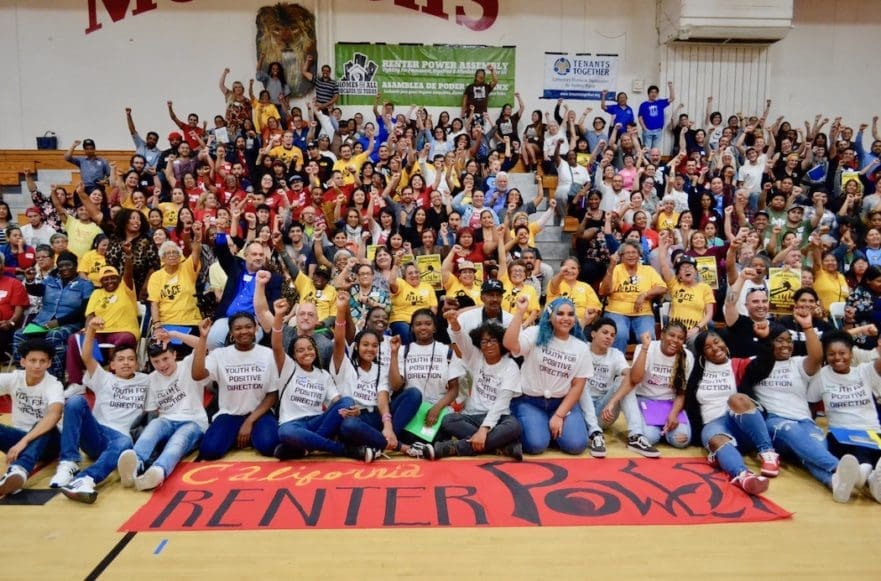This past weekend, inside the Morningside High School gymnasium in Inglewood, hundreds of housing activists and renters, of all ages and colors, sat together in the bleachers and talked solutions. In front of them, Lupe Arreola, executive director of Tenants Together, a statewide housing justice organization, stood on the basketball court, guiding the discussion. It was the kind of meeting that politicians rarely hold.
“The politicians are in and out of the game all the time,” a woman named Mandy told the crowd at one point.
Many people nodded. Others gave a knowing “hmm-hmm.” Some people nodded and hmm-hmm-ed. Nearly everyone clapped.
The meeting was one of the plenaries — this one titled “Debate Key Strategic Questions” — held at the 2019 California Renter Power Assembly. Activists and renters from around the state convened to determine how they, the people who live and work on the frontlines of California’s devastating housing affordability crisis, wanted to address gentrification, unfair rents, a lack of affordable housing, and rising eviction rates.
The attendees, in other words, were figuring out bottom-up, or community-based, solutions rather than top-down, or trickle-down. Politicians and corporations, who like to keep a firm grip on power and wealth, usually have a strong aversion to bottom-up solutions.
Mandy, standing underneath white-and-red basketball championship banners that hung from the gym’s ceiling, was responding to a proposed strategy to elect more tenant rights “champions.” She and many in the crowd weren’t too sure about that. The politicians, explained Mandy, have a habit of saying one thing during a campaign and doing something else once they get into office.
Arreola moved onto other strategies. One was that any new housing that’s built must be permanently affordable. The crowd, which responded to the proposals by holding up small signs that read “agree,” “disagree,” and “don’t know,” threw up a mix of “agree” and “don’t know.”
Arreola asked for comments, and chose a young woman named Deeana, who was given a wireless microphone. She had held up a green “agree” sign.
“The goal is to ultimately de-commodify housing in general,” she told the crowd. “It should be free.”
Deeana got some claps and a few astonished giggles, along with a handful of hmm-hmms.
Arreola pointed to an activist named Susan Hunter, who had raised a yellow “don’t know” sign. Susan is an organizer for Housing Is A Human Right, a housing justice organization.
“The reason I don’t know is you didn’t define what is affordable,” she said.
Susan explained that what may be affordable for some people, may not be affordable for others. She wanted a more concrete definition so the politicians wouldn’t say they were building affordable housing when they weren’t. The claps and hmm-hmms rose in volume as she spelled things out.
Arreola asked for a “temperature check,” to see if people had changed their minds about the affordable housing strategy. This time, “don’t know” signs clearly outnumbered the “agree” signs. A friend of Susan’s playfully needled her for switching the vote. She smiled shyly, saying nothing.
Another proposed strategy was to focus on local victories and organizing rather than fighting local and statewide battles at the same time — because it’s difficult to do both. Without hesitation, an overwhelming majority of the crowd held up blue “disagree” signs.
A woman named Denise said from somewhere in the crowd, “Just because it’s hard doesn’t mean you shouldn’t do it.”
Loud claps sounded off.
A man named Louis said, “I absolutely disagree. The path to rent control is absolutely through the state.”
Another person added: “We have to build more local power and tenant unions.”
Arreola smiled, and said, “I like how people here are saying, ‘We can multitask!’”
She pointed to an older woman named Bon Bon.
“All I have to say is that this is fabulous!” Bon Bon told the crowd. “We’re working together. We’re working collectively… So congratulations!”
After approving claps and a few other comments, Beverly, another older woman, took the microphone. Like Bon Bon, she wanted to remind everyone about the big picture.
“I want to say this: When we fight, we win!”
No one disagreed with her.
Patrick Range McDonald was a longtime staff writer at L.A. Weekly, where he won numerous awards. He’s now an advocacy journalist for Housing Is A Human Right.

